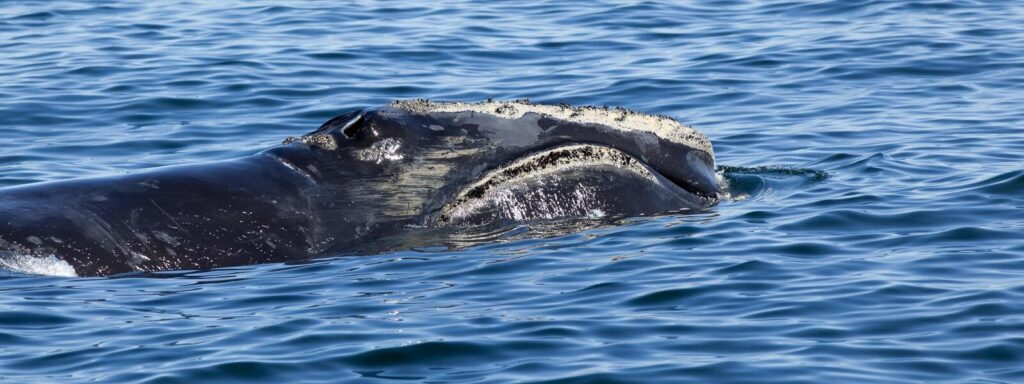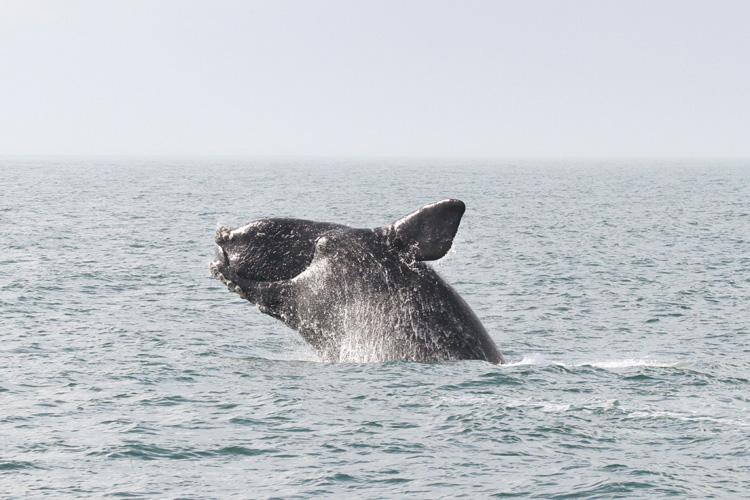US senators introduce bill to prohibit whale-strike speed rule change
 North Atlantic right whale (Eubalaena glacialis) off Grand Manan Island, Bay of Fundy, New Brunswick, Canada.
North Atlantic right whale (Eubalaena glacialis) off Grand Manan Island, Bay of Fundy, New Brunswick, Canada.
Following this week’s hearing on the proposed changes to the North Atlantic Right Whale Vessel Strike Reduction Rule, two US senators have introduced a bipartisan bill that seeks to prevent the National Oceanic and Atmospheric Administration (NOAA) from implementing its proposed vessel speed restriction along the Atlantic seaboard.
NOAA Fisheries is proposing changes to the North Atlantic right whale (Eubalaena glacialis) vessel speed regulations to further reduce the likelihood of mortalities and serious injuries to right whales from vessel collisions.
Collisions with vessels are one of two leading causes of injury and death for North Atlantic right whales, which are dark in colour and difficult to spot, swim slowly at the water’s surface, and lack a dorsal fin. Slower speeds are important for right whale calving season, as mother-calf pairs are especially vulnerable to strikes.
In practice, the proposed speed changes would limit vessels 35ft and above to speeds of 10 knots along much of the US east coast — up to 90 miles out from shore — for up to seven months of the year. Recreational boating and fishing stakeholders argue this will have a detrimental impact on coastal livelihoods. They are urging NOAA to collaborate with the industry to establish alternative solutions to could protect whales.
JUST IN: @Sen_JoeManchin and Sen @JohnBoozman introduce bill to protect the North Atlantic right whale, coastal recreation, and the economy.
— National Marine Manufacturers Association (@therealnmma) June 7, 2023
The bill proposes a data-driven approach to protect marine wildlife, without restricting access to our waters. https://t.co/JsHTXiQGKH
Following the US House Subcommittee hearing on Tuesday (6 June 2023), senators Joe Manchin (Democrat — West Virginia) and John Boozman (Republican — Arkansas), co-chairs of the Congressional Sportsmen’s Caucus and members of the Congressional Boating Caucus, introduced the bipartisan Protecting Whales, Human Safety, and the Economy Act of 2023.
The bill would prohibit NOAA from issuing a rule that modifies or replaces the North Atlantic Right Whale vessel strike reduction regulation until technological solutions recently authorised by Congress can help better track whales and avoid strikes. Industry stakeholders, including the National Marine Manufacturers Association (NMMA), argue that there is a lack of scientific evidence that NOAA’s proposed changes would further protect the North Atlantic right whale population.
“As co-chair of the Congressional Sportsmen’s Caucus and as an avid sportsman myself, I know firsthand how important our fishing culture is to who we are, whether that’s on our trout streams in West Virginia or coastal fishing along the Eastern Seaboard,” says Senator Manchin.
“I’m proud to introduce the bipartisan Protecting Whales, Human Safety, and the Economy Act of 2023 to prevent yet another example of dangerous federal overreach that would place unnecessary burdens on our seasonal fishermen, boat manufacturers and the coastal economies that rely on them. I’ve consistently voted to rein in this Administration’s attempts to regulate critical industries out of business, and I encourage my colleagues on both sides of the aisle to support this bipartisan, commonsense legislation.”
Senator Boozman adds: “We can and should balance protecting wildlife and livelihoods because it is common sense. I’m pleased to join Senator Manchin on this legislation to encourage a reasonable solution for safeguarding the Right Whale population without imposing overly restrictive mandates and inviting unintended consequences.”
NOAA’s proposed changes would impact more than 63,000 registered boats, undoubtedly causing considerable economic harm to coastal economies and the boating and fishing industries.
“America’s $230 billion recreational boating and fishing industry, made up of conservationists who constantly work to protect our treasured natural resources, will bear the brunt of NOAA’s misguided expansion of its North Atlantic Right Whale Vessel Strike Reduction Rule,” says Frank Hugelmeyer, president of NMMA.
“Boaters and anglers deeply respect marine wildlife and know through innovation, technology, and a better understanding of whale migration patterns, our favoured pastime and the North Atlantic right whale can co-exist in our nation’s waters. We applaud Senators Manchin and Boozman for championing this bipartisan legislation and look forward to working alongside Congress to advance this bill and identify data-driven and innovative solutions that protect the North Atlantic right whale, American jobs, small businesses, and coastal economies.”

Glenn Hughes, president of the American Sportfishing Association, says: “We appreciate Sens. Manchin and Boozman for introducing legislation to address the important issue of right whale vessel speed restrictions.
“The sportfishing industry recognises we have a responsibility to help conserve right whales, but NOAA’s deeply flawed proposed vessel speed rule is not the answer. Keeping in place existing speed restrictions will allow NOAA time to fix the many errors in its proposed rule, incorporate emerging technology and work with stakeholders on more viable solutions going forward.”
These comments are echoed by Jeff Angers, president of the Center for Sportfishing Policy. “We thank Senators Manchin and Boozman for introducing the bipartisan Protecting Whales, Human Safety, and the Economy Act of 2023 in pursuit of better alternatives to NOAA’s draconian vessel speed limit proposal,” says Angers. “America’s anglers and boaters lead the way in good stewardship of our nation’s natural resources, and we have been at the forefront of science-based efforts to conserve our marine ecosystems. Unfortunately, NOAA got the science wrong; they got the research wrong, and they got the policy wrong. This important bipartisan legislation seeks to make straight their path.”
Chris Edmonston, president of the BoatUS Foundation, adds: “BoatUS supports the goals of this proposed bill – having NOAA and marine stakeholders work collaboratively to find practical, science-based solutions that will protect marine life, access to our natural resources, and the safety of those who enjoy them.”
“Slowing down is the best way to reduce accidental collisions and protect both whales and human safety. NOAA Fisheries’ science-based rule is vital to the survival and recovery of this iconic species." – Jane Davenport, senior attorney with @Defenders https://t.co/lOZXpg9S0j
— Defenders of Wildlife (@Defenders) June 6, 2023
Jane Davenport, senior attorney with Defenders of Wildlife, issued the following response: “We need seasonal slowdowns to protect right whales in danger zones, just like we have lower speed limits to protect children near schools. Slowing down is the best way to reduce accidental collisions and protect both whales and human safety. NOAA Fisheries’ science-based rule is vital to the survival and recovery of this iconic species.”










